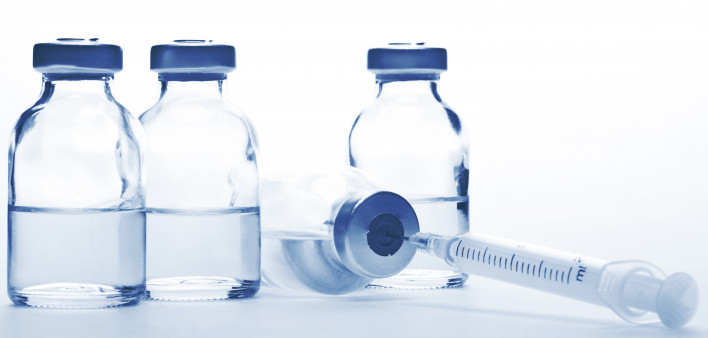On May 16, the Food and Drug Administration (FDA) lifted its clinical hold on lenacapavir, Gilead Sciences’ investigational long-acting HIV capsid inhibitor, after the company switched to a different type of glass vial. Lenacapavir continues to show promise as a treatment both for people starting antiretroviral therapy for the first time and for treatment-experienced people with multidrug-resistant virus, as well as for pre-exposure prophylaxis (PrEP).
Today, the U.S. FDA lifted the clinical hold on our investigational long-acting therapy for #HIV treatment and #PrEP. Read more: https://t.co/iiAH0e8ZSu
— Gilead Sciences (@GileadSciences) May 16, 2022
Lenacapavir disrupts the HIV capsid, the cone-shaped shell that surrounds the viral genetic material and essential enzymes. Laboratory studies have shown that it interferes with multiple stages of the HIV lifecycle. Because it works differently than existing drugs, it remains active against virus that has developed resistance to other antiretrovirals. What’s more, lenacapavir has a long half-life in the body and therefore has the potential to be used for long-acting treatment or prevention.
Treatment-Experienced People
The Phase III CAPELLA trial (NCT04150068) is evaluating lenacapavir in heavily treatment-experienced people whose virus has developed mutations than confer resistance to several earlier antiretrovirals and even whole classes of drugs.
The study enrolled 72 people with highly resistant HIV who were currently on antiretroviral therapy but unable to maintain viral suppression. In the first cohort, 36 participants were randomly assigned to add either oral lenacapavir or a placebo to their failing regimen for 14 days. At that point, everyone was offered lenacapavir injections every six months plus an optimized background regimen. Another 36 people in a nonrandomized cohort received injectable lenacapavir, starting with a 14-day oral lead-in, plus an optimized background regimen from the outset.
As previously reported, the latest results were presented at this year’s Conference on Retroviruses and Opportunistic Infections (CROI), and earlier data were recently published in The New England Journal of Medicine.
At the end of the initial 14-day period—during which lenacapavir was essentially working as monotherapy—88% of lenacapavir recipients in the first cohort experienced at least a 0.5-log drop in viral load, compared with just 17% in the placebo group. At 26 weeks, 81% of people in the first cohort and 83% in the second cohort achieved an undetectable viral load (below 50). Overall response rates were similar at 52 weeks, but response differed according to the number of active drugs in a person’s background regimen. Among those with two or more active drugs, 94% achieved viral suppression, compared with 79% of those with just one active drug and 67% of those with none. Lenacapavir was well tolerated and no serious adverse events were observed.
Initial Treatment
To evaluate first-line treatment, the Phase II CALIBRATE trial enrolled 182 previously untreated people with HIV. After a 14-day oral lead-in period, two groups started lenacapavir injections every six months plus daily oral tenofovir alafenamide/emtricitabine (the drugs in Descovy). At 28 weeks, one group dropped emtricitabine and continued on just tenofovir alafenamide (TAF) for another six months while a second group dropped TAF/emtricitabine and continued on the integrase inhibitor bictegravir. A third group received daily lenacapavir pills plus TAF/emtricitabine for a year. Finally, a control group received standard therapy using daily oral Biktarvy (bictegravir/TAF/emtricitabine).
As previously reported, 94% of those taking oral or injectable lenacapavir and everyone in the control group had an undetectable viral load at 28 weeks. As reported at CROI, 85% to 92% of participants still had viral suppression at 52 weeks. Again, treatment was safe and well tolerated.
Lenacapavir is also being studied as a twice-yearly PrEP option.
Clinical Hold
In late December 2021, Gilead announced that the FDA had put a clinical hold on trials of lenacapavir due to concerns about the type of glass vial used for the injectable formulation, which resulted in tiny glass particles in the medication. On March 1, the FDA issued a complete response letter citing manufacturing and control issues related to the borosilicate glass vials.
This week, Gilead announced that the FDA has lifted the clinical hold on the company’s Investigational New Drug application, allowing trials of injectable lenacapavir for treatment and PrEP to continue. The company offered a comprehensive plan and corresponding data on the storage and compatibility of lenacapavir injection with an alternative vial made from aluminosilicate glass. Gilead said it will now work with study site investigators to fully resume the trials as quickly as possible.
“We are pleased to have identified an alternative vial for lenacapavir, and to now advance the robust clinical program for this potential first-in-class long-acting option for HIV treatment and prevention,” Gilead chief medical officer Merdad Parsey, MD, PhD, said in a press release. “Today’s news brings us one step closer to our goal of offering therapeutic options for the diverse communities affected by HIV as we work to end the epidemic for everyone, everywhere.”
Click here for reports from CROI 2022.
Click here for more news about long-acting HIV treatment.







Comments
Comments